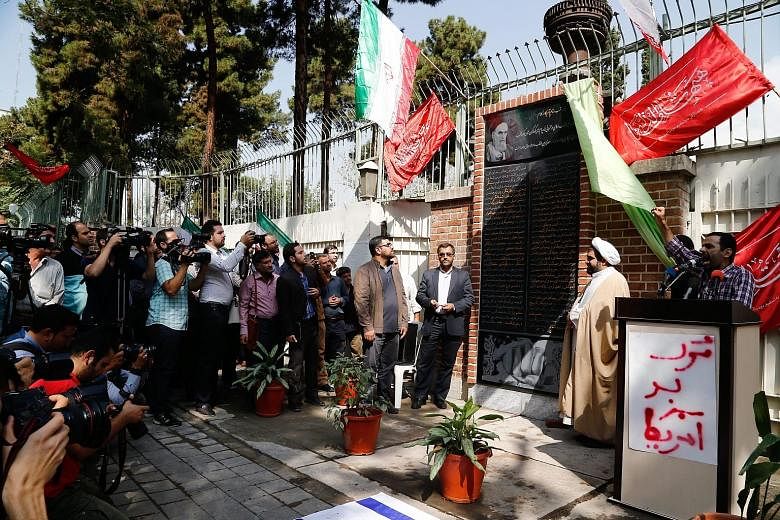WASHINGTON • United States President Barack Obama has all but clinched victory for his Iran nuclear deal, as two Democratic senators threw crucial support behind the landmark accord.
The announcements on Tuesday by the senators, Mr Bob Casey of Pennsylvania and Mr Chris Coons of Delaware, came a week before the Senate was to formally debate a Republican resolution disapproving of the agreement between Iran and six world powers.
Mr Obama would veto any such resolution and, with further announcements of support for the accord expected, any move to override him would almost certainly fail.
Mr Coons' decision, in particular, is likely to resonate with the few remaining undecided Democrats. As an outspoken member of the Senate Foreign Relations Committee, he expressed grave concerns about the deal before ultimately deciding any alternative would be far worse.
Despite the continuing rancour on Capitol Hill, there was also growing recognition, even among some accord opponents, that the other nations - Britain, China, France, Germany and Russia, and especially Iran - would be unwilling to renegotiate the agreement even if Congress formally rejected it.
The pledges of support by Mr Casey and Mr Coons meant the White House was just one vote short of the 34 needed to prevent a disapproval resolution from becoming law. Supporters of the agreement are now hoping to secure 41 votes to filibuster the resolution, ensuring the accord can be implemented without the drama of a presidential veto negating the will of Congress.
In most cases, however, the support has been far less than enthusiastic as lawmakers have confronted one of the most deeply divisive policy debates of modern times, with the security of Israel and the stability of the Middle East potentially at stake.
Mr Casey, who announced his decision in a 17-page memo that included a page and a half of footnotes, said in an interview that he still had many deep reservations, especially doubts that Iran would keep up its end of the bargain. But he said he ultimately concluded that it was in the national security interests of the US to support the agreement.
He said that, after years of leading other countries in sanctioning Iran over its nuclear programme, the US simply could not walk away from the deal, especially when it was clear that the other five powers were prepared to move forward in any event.
Mr Coons said in a speech at the University of Delaware on Tuesday that, just that morning, he had received personal, written assurances from Mr Obama on a range of concerns before finally deciding to endorse the deal.
In the House, Representative Adam Smith of Washington, the ranking Democrat on the Armed Services Committee and an important voice in his party, also came out in favour of the deal on Tuesday. And Representative Hakeem Jeffries of New York came out in support of the accord despite his past reliance on pro-Israel groups for his political rise.
The unease expressed by supporters - including concerns about the possibility that easing sanctions would end up funneling billions of dollars to terrorist groups in the Middle East - underscored the political agony that the nuclear deal has created for lawmakers, particularly Mr Obama's fellow Democrats.
For the President, however, it mattered little how many footnotes, asterisks or other caveats come with the pledges of support.
And with only two Senate Democrats - Mr Charles Schumer of New York and Mr Robert Menendez of New Jersey - publicly opposed so far, it seemed the resolution of disapproval could fall well short of the 60 votes needed to end a filibuster.
All along, opponents of the accord have faced steep obstacles.
To start, they need 60 votes in the Senate to overcome a filibuster and get a vote on the resolution of disapproval. And even if the opponents succeeded in passing the resolution, Mr Obama would veto it. Then, opponents would have to secure the votes of two-thirds of the lawmakers in both chambers to override the veto.
In the Senate, that meant the White House needed 34 votes to be assured of sustaining a veto - a number that was clearly in reach.
Mr Casey said he believed there were enough Democratic votes to sustain a veto, and that the White House had succeeded in making the case that the nuclear deal was worthy of support on the merits.

